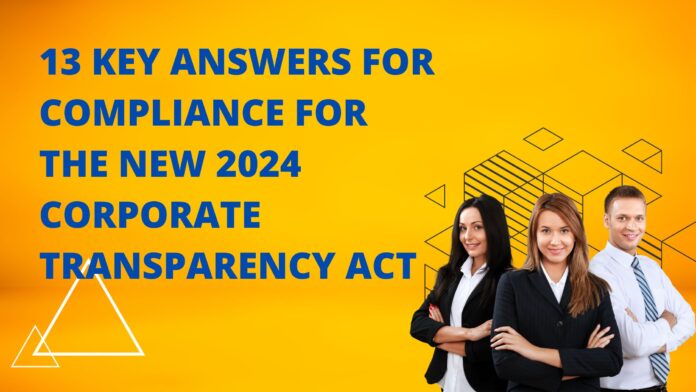The Corporate Transparency Act (CTA) became effective on January 1, 2024.
The law will create a massive government database containing the identities and contact information of defined small corporations and LLC “beneficial owners.” The beneficial owners are the humans who own the entity or exercise substantial control over it.
Government law enforcement and security agencies will use this information to help combat the use of shell companies that engage in money laundering, tax evasion, terrorism, and other crimes.
To comply with the law, new and existing small businesses will have to file a beneficial ownership information (BOI) report with the Department of the Treasury’s Financial Crimes Enforcement Network (FinCEN). Businesses created during 2024 that are subject to the CTA must file a BOI report within 90 days after formation. Businesses created before 2024 have until December 31, 2024, to comply.
The BOI report is filed online in a new federal database called BOSS (an acronym for Beneficial Ownership Secure System). There is no filing fee. The information in the BOSS database is strictly for use by law enforcement, the IRS, and other government agencies—it will not be publicly disclosed.
1. I own a single rental property in an LLC. Do I have to file the BOI report with BOSS?
Yes, you must file a BOI report for every active LLC you own. It makes no difference how many properties the LLC owns. The only exception is if the LLC has more than 20 full-time employees and reported more than $5 million in U.S.-sourced income on its prior-year tax return—these are FinCEN-defined “large operating companies” that are not required to file a BOI report.
2. I own 11 rental properties, each inside its own LLC. Do I have to file 11 separate BOI reports?
Yes, assuming none of the rentals are large operating companies.
3. My CPA says he thinks filing the BOI report for me is an unauthorized practice of law. What do you think?
CPAs and other tax professionals who are not lawyers are allowed to interpret the tax law on behalf of their clients to help with IRS compliance without running afoul of unauthorized practice of law rules.
However the Corporate Transparency Act is not part of the tax law and is not enforced by the IRS. Therefore, filing a BOI report could constitute the unauthorized practice of law by CPAs and other non-lawyers. The unauthorized practice of law is a crime—an activity not covered by CPA liability insurance policies.
What constitutes the unauthorized practice of law is governed by state law and varies by jurisdiction. State bar associations are just beginning to grapple with the question of whether filing BOI reports on behalf of clients constitutes the practice of law. There are as yet no clear answers.
Arguably, simply filling out a BOI report form using information supplied by the client is not the practice of law. On the other hand, determining if a person is a beneficial owner or if an exemption applies could require interpreting the CTA’s complex legal rules (as well as business organization documents), which is the domain of licensed attorneys.
At least one CPA malpractice insurance company (CAMICO) has advised its policyholders that it believes CPAs who assist clients with BOI filings would engage in the practice of law without a license in many states. It recommends that CPAs not provide this service.
Before taking on this work, CPAs, enrolled agents (EAs), and other non-lawyer tax practitioners should contact their malpractice insurer to see if the activity is covered by their policy.
4. How many people could be subject to the $500-a-day penalty?
The penalties for willfully violating the BOI reporting requirements include:
- civil penalties of up to $500 per day that a violation is not remedied
- a criminal fine of up to $10,000, and/or
- imprisonment of up to two years.
There is no limit on the number of people that can be subject to these penalties. Both individuals and corporate entities can be held liable for willful violations of the BOI filing rules. This can include:
- any person who willfully files a false or fraudulent BOI report on a company’s behalf.
- any person who willfully provides the filer of a BOI report with false information to report.
- beneficial owners who willfully fail to file a BOI report or file a false report—this can include a corporation’s officers, directors, and certain of its employees—and an LLC’s members and certain of its employees.
5. Does a self-employed individual or a partner in a partnership have to file?
Self-employed individuals who have not formed an LLC or a corporation for their business do not come within the definition of a reporting company, and they do not have to file a BOI. This is so even if they use a fictitious business name (“dba”) or trade name to identify their business, have obtained a business license, or have an employer identification number (EIN).
Only business entities that are formed by filing a document with the secretary of state or similar officials are reporting companies that must file a BOI. Almost no general partnerships are formed this way, so few general partnerships have to file a BOI report.
Some limited partnerships are formed by filing a document with a secretary of state. These are reporting companies that must file a BOI.
But the individual partners in a limited partnership do not have to file a BOI themselves. The limited partnership must file a single BOI listing all partners with a 25 percent or more ownership interest. The only exception is if the partnership has more than 20 full-time employees and reported more than $5 million in U.S.-sourced income on its prior-year tax return.
6. What if my business doesn’t have a physical address?
The BOI must contain the current street address of the reporting company’s principal place of business—for example, the company’s headquarters. You cannot list a P.O. box, an attorney or registered agent address, or a care-of address.
7. Is it only CPA firms that are subject to Sarbanes-Oxley that don’t have to file the BOI report?
Not exactly. There is an exemption from BOI reporting for public accounting firms that have registered with the Public Company Accounting Oversight Board (PCAOB) under Section 102 of the Sarbanes-Oxley Act of 2002. This enables such firms to audit public companies and broker-dealers. Only about 1,600 of the 46,000 public accounting firms in the U.S. have so registered.
But accounting firms could also be exempt from BOI filing if they are “large reporting companies,” which are defined as those that have more than 20 full-time employees and reported more than $5 million in U.S.-sourced income on their prior-year tax returns.
8. Is the registered agent responsible for filing the BOI report?
No, though some may offer to do so as part of their service.
9. I own a reporting company, but I don’t have a Social Security number; will my individual taxpayer identification number (ITIN) suffice?
You don’t need to list your Social Security number or ITIN in the BOI report. Instead, each beneficial owner must provide the unique identifying number and image from any one of the following documents:
- U.S. passport
- State driver’s license
- Identification number issued by a state or local government or a tribe
- Or, if an individual does not have any of the previous documents, a foreign passport
10. Do I have to name in the BOI the attorney who helped me create my new corporation?
For reporting companies created January 1, 2024, or after, the “company applicant” must be identified in the BOI report along with a business address, date of birth, and identification number.
There can be up to two applicants. The first applicant is always the individual who electronically or physically filed the articles of incorporation for your corporation with the secretary of state. There can also be a second applicant: the individual primarily responsible for directing or controlling the filing of the articles.
If your attorney personally filed the articles or directed the filing of the articles by another person, such as a paralegal in the attorney’s law firm, he or she should be listed as a company applicant. The paralegal would also be a company applicant.
If the attorney prepared the articles but played no role in their filing, the attorney is not a company applicant.
11. If a person listed on the BOI report is later dismissed from the company, does this trigger an entirely new BOI report?
Yes, the BOI report must be kept up to date. If there is a change in the company’s beneficial owners, the company must file an updated BOI report no later than 30 days after the date on which the change occurred.
12. Some years ago, I gave my child 90 percent of my corporation, but he has no voting rights. Do I have to include him as a beneficial owner?
No, not if he or she is still a minor. You can list yourself as the beneficial owner instead. But when your child becomes an adult, your company must file an updated BOI report listing him or her as a beneficial owner.
The fact that your child’s shares have no voting rights has no impact on whether he or she is a beneficial owner for BOI report purposes.
13. If I were a criminal, why would I file the BOI report?
For the same reason, non-criminals file them: to avoid the civil and criminal penalties for not filing.
It is likely that many criminals will not comply with the CTA, just as they fail to comply with many other laws. But here’s the catch: it’s not difficult for FinCEN to match corporate, LLC, and similar filings with a secretary of state and those in the BOSS database.
Fact. Almost all industrialized nations already require that BOI reports be filed by businesses, and those nations have found them helpful in combating money laundering and other criminal activity. The United States is literally the last major country to require centralized BOI filing.
Takeaways
The implementation of the CTA in 2024 marks a significant change in the reporting obligations for defined small corporations and LLCs in the U.S. The new law aims to combat financial crimes by creating a government database of beneficial owners of these entities. Key points include:
Mandatory BOI reporting. All defined small corporations and LLCs must file a BOI report with FinCEN, irrespective of the number of entities or properties they own.
Scope and exceptions. The requirement applies to businesses formed both before and after January 1, 2024.
Exceptions include defined “large operating companies,” which are those with more than 20 employees and more than $5 million in U.S.-sourced income on their prior-year tax returns.
Professional assistance. The role of CPAs, EAs, and other non-lawyers in filing BOI reports is under scrutiny, with concerns about the unauthorized practice of law.
Penalties for non-compliance. Significant civil and criminal penalties are in place for willful violations of the BOI reporting rules.
Exclusions. Self-employed individuals and most partnerships are exempt from filing, based on their business structure.
Practical considerations. The report requires specific information, such as the principal business address, and does not accept P.O. boxes or similar addresses.
Updates and changes. Businesses must update their BOI reports within 30 days of any change in beneficial ownership.
Global context. The U.S. joins other industrialized nations in requiring centralized BOI filing, a measure found effective in combating financial crimes globally.










